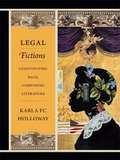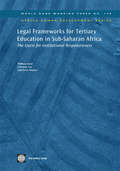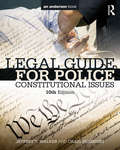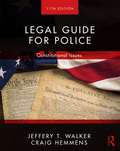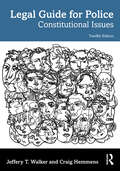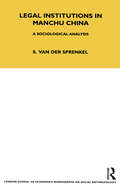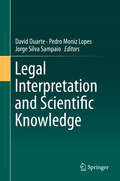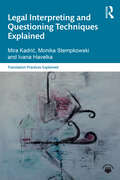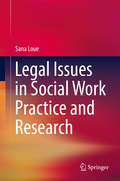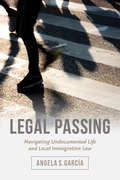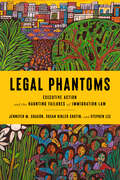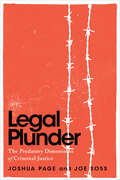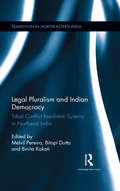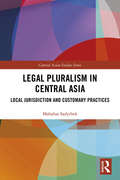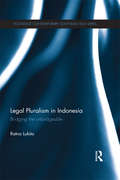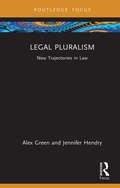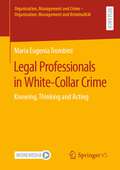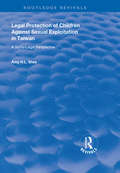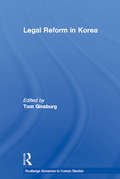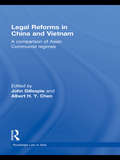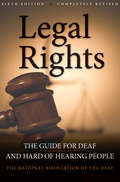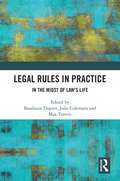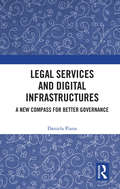- Table View
- List View
Legal Fictions: Constituting Race, Composing Literature
by Karla Fc HollowayIn Legal Fictions, Karla FC Holloway both argues that U.S. racial identity is the creation of U.S. law and demonstrates how black authors of literary fiction have engaged with the law's constructions of race since the era of slavery. Exploring the resonance between U.S. literature and U.S. jurisprudence, Holloway reveals Toni Morrison's Beloved and Charles Johnson's Middle Passage as stories about personhood and property, David Bradley's The Chaneysville Incident and Ralph Ellison's Invisible Man as structured by evidence law, and Nella Larsen's Passing as intimately related to contract law. Holloway engages the intentional, contradictory, and capricious constructions of race embedded in the law with the same energy that she brings to her masterful interpretations of fiction by U.S. writers. Her readings shed new light on the many ways that black U.S. authors have reframed fundamental questions about racial identity, personhood, and the law from the nineteenth into the twenty-first centuries. Legal Fictions is a bold declaration that the black body is thoroughly bound by law and an unflinching look at the implications of that claim.
Legal Frameworks for Tertiary Education in Sub-Saharan Africa
by William Saint Christine LaoThe performance of tertiary educational institutions is heavily influenced by their governance arrangements, management structures, accountability mechanisms, and regulatory environments. 'Legal Frameworks for Tertiary Education in Sub-Saharan Africa' analyzes 70 examples of tertiary education legislation and individual statutes of selected public institutions in 24 Sub-Saharan African countries. It identifies the range of formal governance and management practices for university educational systems set forth in these legal documents. These factors are fundamental for determining the responsiveness, adaptability, and flexibility of tertiary education systems, and ultimately the capacity of these systems to manage change and maintain relevance under continually shifting circumstances. Overall, the analysis finds general tendencies to increase institutional autonomy, to strengthen accountability mechanisms, to shift from appointment to elective representation in the filling of higher governance and management positions, and to expand university links with civil society, the private sector, and regional and international institutions.
Legal Guide for Police: Constitutional Issues
by Craig Hemmens Jeffery T. WalkerLegal Guide for Police, 10th edition, is a valuable tool for criminal justice students and law enforcement professionals, bringing them up-to-date with developments in the law of arrest, search and seizure, police authority to detain, questioning suspects and pretrial identification procedures, police power and its limitations, and civil liability of police officers and agencies. Including specific case examples, this revised edition provides the most current information for students and law enforcement professionals needing to develop a modern understanding of the law. Authors Walker and Hemmens have added introductory and summary chapters to this edition, which aid readers in understanding the context, importance, and applicability of the case law. All chapters have been updated to reflect U.S. Supreme Court decisions up to and including the 2013 term of court. Among the important new cases covered are: Bailey v. United States (2013), Berghuis v. Thompkins (2010), Kentucky v. King (2010), Maryland v. King (2013), and Michigan v. Bryant (2011). A helpful Appendix contains the Bill of Rights and the Fourteenth Amendment, and a Table of Cases lists every case referenced in the text.
Legal Guide for Police: Constitutional Issues
by Craig Hemmens Jeffery T. WalkerLegal Guide for Police: Constitutional Issues, 11th Edition, is a valuable tool for criminal justice students and law enforcement professionals, bringing them up-to-date with developments in the law of arrest, search and seizure, police authority to detain, questioning suspects and pretrial identification procedures, police power and its limitations, and civil liability of police officers and agencies. Including specific case examples, this revised edition provides the most current information for students and law enforcement professionals needing to develop an up-to-date understanding of the law. Authors Walker and Hemmens have included introductory and summary chapters to aid readers in understanding the context, importance, and applicability of the case law. A new chapter covers warrantless searches involving cell phones and other technology, as well as vehicles. All chapters have been updated to reflect U.S. Supreme Court decisions up to and including the 2018 term of court. Important cases added to this edition include: Riley v. California (2014), Florida v. Jardines (2013), Birchfield v. North Dakota (2016), Heien v. North Carolina (2014), and Byrd v. United States (2018). A helpful Appendix contains the Bill of Rights and the Fourteenth Amendment, and a Table of Cases lists every case referenced in the text.
Legal Guide for Police: Constitutional Issues
by Craig Hemmens Jeffery T. WalkerLegal Guide for Police: Constitutional Issues, 12th Edition, is a valuable tool for criminal justice students and law enforcement professionals, bringing them up-to-date with developments in the law of arrest, search and seizure, police authority to detain, questioning suspects and pretrial identification procedures, police power and its limitations, and civil liability of police officers and agencies. Including specific case examples, this revised edition provides the most current information for students and law enforcement professionals needing to develop an up-to-date understanding of the law. Authors Walker and Hemmens have included introductory and summary chapters to aid readers in understanding the context, importance, and applicability of the case law. All chapters have been updated to reflect U.S. Supreme Court decisions up to and including the 2021 term of court. Important cases added to this edition include: Caniglia v. Strom (2021) (warrantless search), Kansas v. Glover (2020) (vehicle stop), Mitchell v. Wisconsin (2019) (warrantless drawing of blood), Rivas-Villegas v. Cortesluna (qualified immunity), and Nieves v. Bartlett (2018) (retaliatory arrest). A helpful Appendix contains the Bill of Rights and the Fourteenth Amendment, and a Table of Cases lists every case referenced in the text.
Legal Institutions in Manchu China: A Sociologial Analysis Revised Edition Volume 24
by Sybille SprenkelMrs van der Sprenkel was led to undertake this journey by her experiences while living in China. lt is a detailed sociological analysis of the whole complex of legal and quasi-legal institutions during the Manchu period. Using a wide range of source material, Mrs van der Sprenkel discusses both the concepts underlying and the actual working of government and administration in Manchu China, the nature of the law, judicial procedure, and, finally, the effectiveness of the law in supporting social order.
Legal Interpretation and Scientific Knowledge
by David Duarte Jorge Silva Sampaio Pedro Moniz LopesThis book discusses the question of whether legal interpretation is a scientific activity. The law’s dependency on language, at least for the usual communication purposes, not only makes legal interpretation the main task performed by those whose work involves the law, but also an unavoidable step in the process of resolving a legal case. This task of decoding the words and sentences used by normative authorities while enacting norms, carried out in compliance with the principles and rules of the natural language adopted, is prone to all of the difficulties stemming from the uncertainty intrinsic to all linguistic conventions. In this context, seeking to determine whether legal interpretation can be scientific or, in other words, can comply with the requirements for scientific knowledge, becomes a central question. In fact, the coherent application of the law depends on a knowledge regarding the meaning of normative sentences that can be classified (at least) as being structured, systematically organized and tendentially objective. Accordingly, this book focuses on analyzing precisely these problems; its respective contributions offer a range of revealing perspectives on both the problems and their ramifications.
Legal Interpreting and Questioning Techniques Explained (Translation Practices Explained)
by Mira Kadrić Monika Stempkowski Ivana HavelkaLanguage and law are closely linked, and language is fundamental to the application of the law. Legal, criminalistic, translational and psychological aspects of communication come together in interpreted questioning (hearings, interrogations, interviews) and must be taken into account, especially since the way in which the questioning outcomes are evaluated can have far-reaching legal consequences. Building on empirical studies and practice, this accessible text provides a transdisciplinary examination of questioning methods and strategies. The institutional framework conditions of a questioning situation are examined in the context of transdisciplinary cooperation.This book also addresses the increasing use of technology and hybrid forms of translation and interpreting in the legal system, and shows different ways in which interpreters co-construct information. Chapters include summaries of key concepts and definitions, examples from existing literature combined with practical experience and the results of surveys conducted by the authors, as well as further reading and non-language-specific study activities. Activities include role plays on thematic scenarios involving different actors in criminal proceedings and discussion groups to enable reflection on ethical issues and discursive challenges.This is a vital text for both advanced students and professionals in interpreting studies and criminology.
Legal Issues in Social Work Practice and Research
by Sana LoueThis highly practical text surveys the myriad legal and ethical issues that social workers encounter both in daily practice and under special circumstances. Its initial section presents concepts in law and ethics that unite practitioners, researchers, and academics in the field, such as confidentiality, informed consent, and the interplay between social work and administrative and judicial systems. A selection of representative cases illustrates legal aspects involved in providing services to families, children, elders, and persons with disabilities. Also included are chapters on advocacy in social work, both in its potential to influence policy and on the global stage as part of the ongoing struggle for human rights and dignity.Among the topics covered:Confidentiality and the social worker-client relationshipLiability issues for social workers in the clinical contextLegal issues arising in the context of social work researchThe social worker and forensic social workSocial worker involvement in access to school and school servicesSocial work in the context of health careLegal issues working with immigrants, refugees, and asyleesThe interface between social work and human rightsLegal Issues in Social Work Practice and Research is an interdisciplinary text aimed at social work, mental health, and legal professionals. It enhances the power of social work as an integrative system to support clients’ rights and agency.
Legal Lynching: Racism, Injustice, and the Death Penalty
by Jesse JacksonA legal and ethical analysis of the death penalty.
Legal Passing: Navigating Undocumented Life and Local Immigration Law
by Angela S. GarcíaLegal Passing offers a nuanced look at how the lives of undocumented Mexicans in the US are constantly shaped by federal, state, and local immigration laws. Angela S. García compares restrictive and accommodating immigration measures in various cities and states to show that place-based inclusion and exclusion unfold in seemingly contradictory ways. Instead of fleeing restrictive localities, undocumented Mexicans react by presenting themselves as “legal,” masking the stigma of illegality to avoid local police and federal immigration enforcement. Restrictive laws coerce assimilation, because as legal passing becomes habitual and embodied, immigrants distance themselves from their ethnic and cultural identities. In accommodating destinations, undocumented Mexicans experience a localized sense of stability and membership that is simultaneously undercut by the threat of federal immigration enforcement and complex street-level tensions with local police. Combining social theory on immigration and race as well as place and law, Legal Passing uncovers the everyday failures and long-term human consequences of contemporary immigration laws in the US.
Legal Phantoms: Executive Action and the Haunting Failures of Immigration Law
by Stephen Lee Susan Bibler Coutin Jennifer M. ChacónThe 2012 Deferred Action for Childhood Arrivals (DACA) program was supposed to be a stepping stone, a policy innovation announced by the White House designed to put pressure on Congress for a broader, lasting set of legislative changes. Those changes never materialized, and the people who hoped to benefit from them have been forced to navigate a tense and contradictory policy landscape ever since, haunted by these unfulfilled promises. Legal Phantoms tells their story. After Congress failed to pass a comprehensive immigration bill in 2013, President Obama pivoted in 2014 to supplementing DACA with a deferred action program (known as DAPA) for the parents of citizens and lawful permanent residents and a DACA expansion (DACA+) in 2014. But challenges from Republican-led states prevented even these programs from going into effect. Interviews with would-be applicants, immigrant-rights advocates, and government officials reveal how such failed immigration-reform efforts continue to affect not only those who had hoped to benefit, but their families, communities, and the country in which they have made an uneasy home. Out of the ashes of these lost dreams, though, people find their own paths forward through uncharted legal territory with creativity and resistance.
Legal Plunder: Households and Debt Collection in Late Medieval Europe
by Daniel Lord SmailAs a Europe grew rich in the Middle Ages, the well-made clothes, linens, and wares of households often substituted for hard currency. Pawnbrokers kept goods in circulation, and sergeants of the law marched into debtors' homes to seize belongings equal in value to debts owed. David Smail describes a material world on the cusp of modern capitalism.
Legal Plunder: The Predatory Dimensions of Criminal Justice (Chicago Studies in American Politics)
by Joe Soss Joshua PageA searing, historically rich account of how US policing and punishment have been retrofitted over the last four decades to extract public and private revenues from America’s poorest and most vulnerable communities. Alongside the rise of mass incarceration, a second profound and equally disturbing development has transpired. Since the 1980s, US policing and punishment have been remade into tools for stripping resources from the nation’s most oppressed communities and turning them into public and private revenues. Legal Plunder analyzes this development’s origins, operations, consequences, and the political struggles that it has created. Drawing on historical and contemporary evidence, including original ethnographic research, Joshua Page and Joe Soss examine the predatory dimensions of criminal legal governance to show how practices that criminalize, police, and punish have been retrofitted to siphon resources from subordinated groups, subsidize governments, and generate corporate profits. As tax burdens have declined for the affluent, this financial extraction—now a core function of the country’s sprawling criminal legal apparatus—further compounds race, class, and gender inequalities and injustices. Legal Plunder shows that we can no longer afford to overlook legal plunder or the efforts to dismantle it.
Legal Pluralism and Indian Democracy: Tribal Conflict Resolution Systems in Northeast India (Transition in Northeastern India)
by Melvil Pereira Bitopi Dutta Binita KakatiThis book offers a multifaceted look at Northeast India and the customs and traditions that underpin its legal framework. The book: charts the transition of traditions from colonial rule to present day, through constitutionalism and the consolidation of autonomous identities, as well as outlines contemporary debates in an increasingly modernising region; explores the theoretical context of legal pluralism and its implications, compares the personal legal systems with that of the mainland, and discusses customary law’s continuing popularity (both pragmatic and ideological) and common law; brings together case studies from across the eight states and focuses on the way individual systems and procedures manifest among various tribes and communities in the voices of tribal and non-tribal scholars; and highlights the resilience and relevance of alternative systems of redressal, including conflict resolution and women’s rights. Part of the prestigious ‘Transition in Northeastern India’ series, this book presents an interesting blend of theory and practice, key case studies and examples to study legal pluralism in multicultural contexts. It will be of great interest to students of law and social sciences, anthropology, political science, peace and conflict studies, besides administrators, judicial officers and lawyers in Northeast India, legal scholars and students of tribal law, and members of customary law courts of various tribal communities in Northeast India.
Legal Pluralism in Central Asia: Local Jurisdiction and Customary Practices (Central Asian Studies)
by Mahabat SadyrbekLegal Pluralism in Central Asia reports on historical, anthropological and legal research which examines customary legal practices in Kyrgyzstan and relates them to wider societal developments in Central Asia and further afield. Using the term legal pluralism, the book demonstrates that there is a spectrum of approaches, available avenues, forms of local law and indigenous popular justice in Kyrgyzstan’s predominantly rural communities, which can be labelled living law. Based on her extensive original research, Mahabat Sadyrbek shows how contemporary peoples systematically address challenging problems, such as disputes, violence, accidents, crime and other difficulties, and thereby seek justice, redress, punishment, compensation, readjustment of relations or closure. She demonstrates that local law, expressed through ritually structured communicative exchange, through dictums and proverbs with binding characters and different legal practices or processes undertaken in specific ways, deem the solutions appropriate and acceptable. The reader is thereby enabled to see the law in people’s deepest assumptions and beliefs, in codes of shame and honour, in local mores and ethics as well as in religious terms. In this way, the book reveals the dynamic, changing and living character of law in a specific context and in a region hitherto insufficiently researched within legal anthropology.
Legal Pluralism in Indonesia: Bridging the Unbridgeable (Routledge Contemporary Southeast Asia Series)
by Ratno LukitoWith the revival of Islamic law and adat (customary) law in the country, this book investigates the history and phenomenon of legal pluralism in Indonesia. It looks at how the ideal of modernity in Indonesia has been characterized by a state-driven effort in the post-colonial era to make the institution of law an inseparable part of national development. Focusing on the aspects of political and ‘conflictual’ domains of legal pluralism in Indonesia, the book discusses the understanding of the state’s attitude and behaviour towards the three largest legal traditions currently operative in the society: adat law, Islamic law and civil law. The first aspect is addressed by looking at how the state specifically deals with Islamic law and adat law, while the second is analysed in terms of actual cases of private interpersonal law, such as interfaith marriage, interfaith inheritance and gendered inheritance. The book goes on to look at how socio-political factors have influenced the relations between state and non-state laws, and how the state’s strategy of accommodation of legal pluralism has in fact largely depended on the extent to which those legal traditions have been able to conform to national ideology. It is a useful contribution for students and scholars of Asian Studies and Law.
Legal Pluralism: New Trajectories in Law (ISSN)
by Jennifer Hendry Alex GreenThis book examines the development and fundamental nature of legal pluralism. Legal pluralism evokes two distinctions: ‘state’ vs ‘non-state’ law; and ‘law’ vs ‘non-law’. As such, although this book focuses upon circumstances in which two or more legal orders compete to govern the same social space, it also addresses the nature of law in general. Drawing on material conflicts arising within jurisdictions such as Australia, Burundi, Cameroon, Gambia, the United States, and Zambia, this book explores the conceptual, moral, and political challenges that legal pluralism creates. Emphasising that non-state law carries no less dignity than that often ascribed to the legal orders of contemporary states, it advances a theoretically sophisticated argument in favour of recognising and respecting genuine cases of legal pluralism, wherever they arise. Accessible and thought provoking, this book will appeal to legal scholars, anthropologists, sociologists, and political and social philosophers as well as practising lawyers, judges, and policymakers who deal with issues of legal pluralism.
Legal Professionals in White-Collar Crime: Knowing, Thinking and Acting (Organization, Management and Crime - Organisation, Management und Kriminalität)
by Maria Eugenia TrombiniThis work is dedicated to map the modes of thinking and acting of legal professionals who work in white-collar crime. Lawyers, whose decisions generate economic and political consequences, stand at a strategic location between the state and key segments of society. This monograph’s approach is linked to the foundations of the sociology of knowledge, that culture antecedes and anchors social action. It starts by reconstructing the worldviews that legal professionals hold about corruption and its main participants, and then advances to examine decision-making. The author is introducing an innovative dataset comprised of interviews, court records and biographical data to investigate Brazilian lawyers (1985-2021). The study’s qualitative findings show a professional cognitive pattern that is apolitical and technical, and criticizes unskilled people working in the state administration more than businesspeople. The dominant mindset understands corporate-state relations as a self-feeding system that requires qualification and awareness of international trends to counter crime. The decision-making patterns confirm: (i) that prosecutors and judges prioritize the ends, fighting corruption, and use existing legislation and organizational resources to secure verdicts; (ii) the asymmetries between how bribe-payers and bribe-payees are treated.
Legal Protection of Children Against Sexual Exploitation in Taiwan: Socio-legal Perspective (Routledge Revivals)
by Amy H.L. SheeFirst published in 1998, this volume responds to child-prostitution being recognised as a major social problem in modern capitalist Taiwan. It is defined, both legally and socially, as a problem of ‘sexual transactions involving children and juveniles’, thus the issue of child maltreatment is submerged under other concerns. However, the main concern of this book is the protection of children from maltreatment, so related socio-legal measures will be examined by this parameter. During the social campaigns against child prostitution, structural problems such as police corruption, male sexual perversion, socio-economic inequality, and the maladjustment of aboriginal people in the modern Taiwanese society are subjugated to increasing criticism. Nevertheless, efforts to encounter any of them have had very limited accomplishment. This book intends to show that the functions of law in the prevention and treatment of the social problem of child prostitution cannot work as intended if those structural problems are not properly tackled. Suggestions are also made to address the need to reconceptualise the problem in the analytical framework of child maltreatment and to recommend the direction for reformation of policy and practice.
Legal Reform in Korea (Routledge Advances in Korean Studies #Vol. 5)
by Tom GinsburgLaw in Korea has historically been viewed as merely a tool of authoritarian rule, but since the transition to democracy in 1987 it has served a more important and visible role as a force for social change. With contributions from leading US and Korean scholars, Legal Reform in Korea explores this response to domestic and international pressures, applying a socio-legal perspective to both legal practices and the legal institutions themselves, which have become a major political issue throughout the developing world. An invaluable resource for students of Asian law and Korean studies.
Legal Reforms in China and Vietnam: A Comparison of Asian Communist Regimes (Routledge Law in Asia)
by John Gillespie Albert H.Y. ChenAlthough the adoption of market reforms has been a key factor leading to China’s recent economic growth, China continues to be governed by a communist party and has a socialist-influenced legal system. Vietnam, starting later, also with a socialist-influenced legal system, has followed a similar reform path, and other countries too are now looking towards China and Vietnam as models for development. This book provides a comprehensive, comparative assessment of legal developments in China and Vietnam, examining similarities and differences, and raising important questions such as: Is there a distinctive Chinese model, and/or a more general East Asian Model? If so, can it be flexibly applied to social and economic conditions in different countries? If it cannot be applied to a culturally and politically similar country like Vietnam, is the model transportable elsewhere in the world? Combining ‘micro’ or interpretive methods with ‘macro’ or structural traditions, the book provides a nuanced account of legal reforms in China and Vietnam, highlighting the factors likely to promote, change or resist the spread of the Chinese model.
Legal Rights, 6th Ed.: The Guide for Deaf and Hard of Hearing People
by National Association of the DeafThe standard handbook on law affecting deaf and hard of hearing people has been completely rewritten and updated. The sixth edition of Legal Rights: The Guide for Deaf and Hard of Hearing People meticulously describes those statutes that prohibit discrimination against deaf and hard of hearing people, and any others with physical challenges. Written in easy-to-understand language, the new edition describes the core legislation and laws and their critical importance since their inception: The Rehabilitation Act of 1973, the Individuals with Disabilities Education Act (IDEA), and the Americans with Disabilities Act (ADA). The new Legal Rights also explains the significant amendments to these laws, including the ADA Amendments Act (ADAAA) and new regulations to its Title II concerning public entities and Title III pertaining to public accommodations and commercial facilities. The reauthorization of IDEA expanded the No Child Left Behind Act requirement for highly qualified teachers to all students with disabilities. This new edition also tracks the trend of passing a Deaf and Hard of Hearing Children's Bill of Rights in a growing number of state legislatures. This completely new resource also delineates new legislation such as the Twenty-First Century Communications Video and Accessibility Act, which ensures access to the newest communications technology for deaf and hard of hearing people. Legal Rights also includes information on the use of interpreters in the legal system, securing its position as the most comprehensive reference of legal information for deaf and hard of hearing people now available.
Legal Rules in Practice: In the Midst of Law’s Life
by Baudouin Dupret; Julie Colemans; and Max TraversUnderstanding legal rules not as determinants of behavior but as points of reference for conduct, this volume considers the ways in which rules are invoked, referred to, interpreted, put forward or blurred. It also asks how both legal practitioners and lay participants conceive of and participate in the construction of facts and rules, and thus, through decisions, defenses, pleas, files, evidence, interviews and documents, actively participate in law’s life. With attention to the formulation of notions such as person, evidence, intention, cause and responsibility in the course of legal practices, Legal Rules in Practice provides the outlines of a praxiological anthropology of law – an anthropology that focuses on words, concepts and reasoning as actively used to solve conflicts with the help of legal rules. As such, it will appeal to sociologists, anthropologists and scholars of law with interests in ethnomethodology, rule-based conduct and practical reasoning.
Legal Services and Digital Infrastructures: A New Compass for Better Governance
by Daniela PianaThis book seeks to provide and promote a better understanding and a more responsive and inclusive governance of the automation and digital devices in public institutions, particularly the law and justice sector. Concerns related to AI design and use have been exacerbated recently with the recognition of the discriminatory potential that can be embedded into AI applications in public service institutions. This book examines issues relating to the assigning of responsibility in a public service produced and delivered on the basis of an automated mechanism. It encourages critical thinking about the legal services and the justice institutions as they are transformed by AI and automation. It raises awareness as to the prospect of transformation we face in terms of responsibility and of agency and the need to design a citizen-centered and human rights compliant system of technology assessment and AI monitoring and evaluation. The book calls for a comprehensive strategy to enable professional practitioners and decision makers to engage in the design of AI driven legal and justice services. The work draws on on-going research and consulting activities carried out by the author across different countries and different systems in the legal and justice sector. The book offers a critical approach to encourage a new mindset among legal professionals and the justice institutions thus empowering and training them to develop the necessary responsiveness and accountability in the justice sector and legal systems. It will also be of interest to researchers and academics working in the area of AI, Public Law, Human Rights and Criminal Justice.
